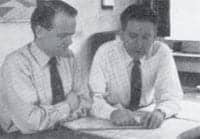Updated November 16, 2017
Erik Westermann—who with Christian Tøpholm founded Widex in Denmark in 1956—died quietly in his sleep last Tuesday morning, October 24. He was 94.
Westermann— known at Widex as “EW”— made it his life’s work to build Widex into a strong international company in the hearing aid industry. The story of how he and his business partner, the late Christian Tøpholm—both former employees of William Demant—decided to establish Widex over a bottle of red Martini one late evening is well known. There was only one way forward from that point. The company essentially started on that kitchen table and ultimately, with considerable help from their sons, would become one of the six largest hearing aid companies in the world.
EW was initially educated in the textile industry, supplemented by two years at Niels Brock School of Business in Copenhagen and private studies in French and Spanish. Characteristically, as a determined young man, he chose to enter the Danish resistance struggle during the German occupation of Denmark during WWII. He and his division were captured by the Germans and sent to the concentration camp Neuengamme, south of Hamburg.
Westermann had many harrowing scrapes during the war. He told The Hearing Review in 2011 that, as members of the resistance, they were lined up by their captors for death by a firing squad, but for reasons he never fully understood, were spared by the Nazi commander at the last minute (or possibly the commander’s wife as it was being held on Christmas Eve). Then later, in route by train to the concentration camp, the prisoners’ rail cars were parked on the tracks in Bremen, Germany, as the city was bombed relentlessly by Allied planes. After 4 hard months in the camp, he was driven by the Red Cross’s white buses, arranged by Swedish Count Bernadotte, to Sweden, from where he returned home after Denmark’s liberation.

Widex Co-founder Erik Westermann (r) with Hearing Review Editor Karl Strom at Widex Headquarters in 2011.
After the war, Westermann worked in Spain for two years, where he was as a correspondent in Vigo and consulate secretary in Barcelona. There he honed his Spanish and laid the foundation for his love for the southern European countries and South America.
Westermann was an extremely interesting, energetic, caring, and affable gentleman. He had very close relationships with Widex distributors and was always ready to help them both professionally and privately. When he and Tøpholm first started Widex, it was the Tøpholm, an engineer, who concentrated more on the technical aspects of the hearing aids. Westermann was the driving force responsible for sales, as well as building a network of international distributors who would loyally sell and market the Widex brand in their various markets. Very early on, Westermann saw the international opportunities and laid the foundation in the 50s and 60s for Widex’s burgeoning international representation—a network that now spans 38 sales companies worldwide.
As with his US colleagues, Harold Spar and Henry Meltsner (and England’s Peter C. Werth), Westermann is also credited with playing an instrumental role in encouraging the growth of independent hearing aid dispensing in an age when single-line distribution dominated the industry.
According to Widex, Westermann was active in the company to the very end. At Widex’s 60th anniversary in 2016, he gave a gripping speech in which he praised Widex employees, and thanked the international distributors in their own language. He was often in his office at Widex headquarters, and as recently as 5 weeks ago when he attended a lunch with Spanish ENT doctors and promoted the company’s story.
“We will all miss EW and with his death comes the end of an era,” said Widex in a press announcement. “But it will be in the spirit of EW that we all in Widex work unreservedly to expand and strengthen the business. He would appreciate that in 100 years there will also be a strong and growing Widex.”
Erik Westermann leaves behind his wife, Gerda, as well as three sons and five grandchildren.







I wish Mr Westermann a peaceful rest.
As a Widex distributor, I admire his life and achievements, which surround us in our everyday work.
I would only like to point out that WWII began in 1939, the same year when Spanish Civil War ended and Franco began to rule the country.
Thus, the anecdotic event, as it is told in the text, seems to be wrong.
Hmmm. I will go back into the story and take this out. This was from my foggy recollection of a conversation (10 years ago) I had with Mr. Westermann. I apologize if I got it wrong. My guess is he meant that Franco was a young man, and I took that to mean he was still ascending the ranks to power. Thanks for setting this straight Charles.
People like Mr Westermann, are visionaries. Look where we are now.
Sleep peacefully
Spd